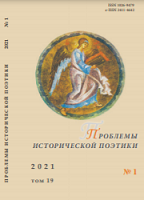Антропологическая проблематика творчества Ф. М. Достоевского
Anthropological Problems of F. M. Dostoevsky’s Creativity
Author(s): Marina A. ShalinaSubject(s): Christian Theology and Religion, Anthropology, Studies of Literature, Russian Literature, 19th Century, Eastern Orthodoxy
Published by: Петрозаводский государственный университет
Keywords: F. M. Dostoevsky; anthropology; typology of a literary hero; heroideologist; underground; Orthodox epistemology; panhuman; vsechelovek;
Summary/Abstract: The article deals with the anthropological aspects of Dostoevsky’s creative work. Its study requires researchers to take into account the classic’s pronounced Christian orientation of the artistic system. In the center of this system is the ideal of Christ, in whose light Dostoevsky’s concept of man is formed and the typology of characters is determined. The dominant type is the hero-ideologist, however, in addition to the underground type, he is also represented by the heroes of the “positive idea”. The latter preach the idea of salvation through the transformation of the person in Christ, rather than the idea of forcibly changing the world to achieve universal happiness. However, Dostoevsky’s anthropological discovery was not only the idea of compassion for a person fallen in sin, but also the concept of human transience in earthly existence, and hence the assertion of the idea of immortality, in which man will achieve his fullness and harmony. The quintessence of Dostoevsky’s anthropological concept is the idea of “all-humanity” (“vsechelovechnost”) and “universal responsiveness”, capable of uniting people on the basis of spiritual brotherhood and acceptance of the alien as one’s own.
Journal: Проблемы исторической поэтики
- Issue Year: 19/2021
- Issue No: 1
- Page Range: 209-220
- Page Count: 12
- Language: Russian

